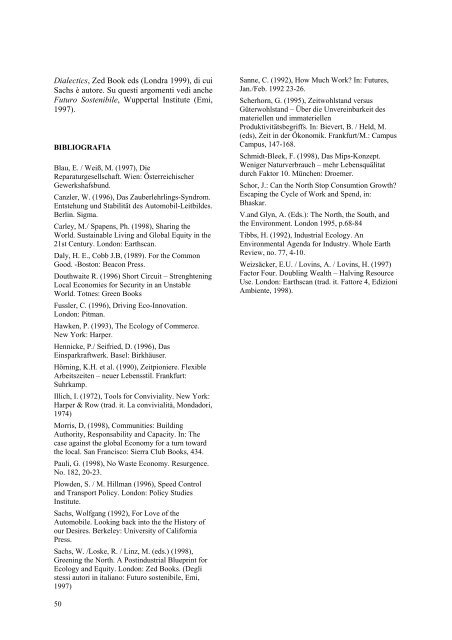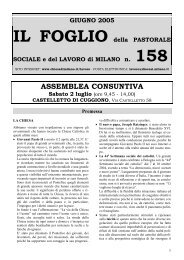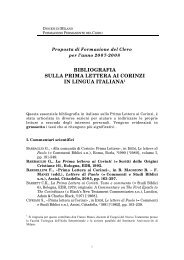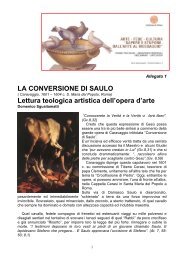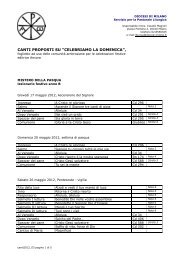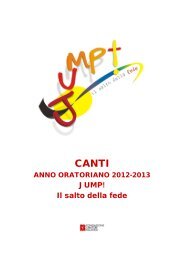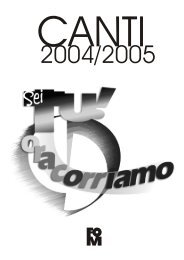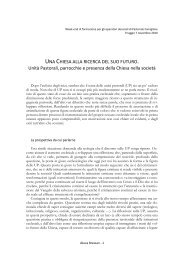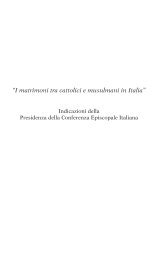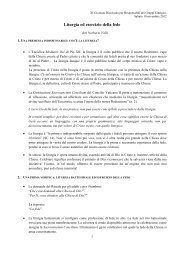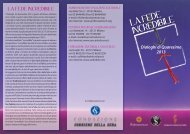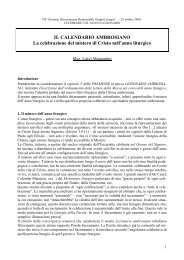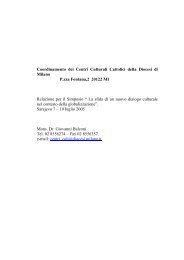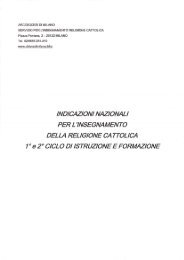Abitare la terra: questione ambientale
Abitare la terra: questione ambientale
Abitare la terra: questione ambientale
Create successful ePaper yourself
Turn your PDF publications into a flip-book with our unique Google optimized e-Paper software.
Dialectics, Zed Book eds (Londra 1999), di cui<br />
Sachs è autore. Su questi argomenti vedi anche<br />
Futuro Sostenibile, Wuppertal Institute (Emi,<br />
1997).<br />
BIBLIOGRAFIA<br />
B<strong>la</strong>u, E. / Weiß, M. (1997), Die<br />
Reparaturgesellschaft. Wien: Österreichischer<br />
Gewerkshafsbund.<br />
Canzler, W. (1996), Das Zauberlehrlings-Syndrom.<br />
Entstehung und Stabilität des Automobil-Leitbildes.<br />
Berlin. Sigma.<br />
Carley, M./ Spapens, Ph. (1998), Sharing the<br />
World. Sustainable Living and Global Equity in the<br />
21st Century. London: Earthscan.<br />
Daly, H. E., Cobb J.B, (1989). For the Common<br />
Good. -Boston: Beacon Press.<br />
Douthwaite R. (1996) Short Circuit – Strenghtening<br />
Local Economies for Security in an Unstable<br />
World. Totnes: Green Books<br />
Fussler, C. (1996), Driving Eco-Innovation.<br />
London: Pitman.<br />
Hawken, P. (1993), The Ecology of Commerce.<br />
New York: Harper.<br />
Hennicke, P./ Seifried, D. (1996), Das<br />
Einsparkraftwerk. Basel: Birkhäuser.<br />
Hörning, K.H. et al. (1990), Zeitpioniere. Flexible<br />
Arbeitszeiten – neuer Lebensstil. Frankfurt:<br />
Suhrkamp.<br />
Illich, I. (1972), Tools for Conviviality. New York:<br />
Harper & Row (trad. it. La convivialità, Mondadori,<br />
1974)<br />
Morris, D, (1998), Communities: Building<br />
Authority, Responsability and Capacity. In: The<br />
case against the global Economy for a turn toward<br />
the local. San Francisco: Sierra Club Books, 434.<br />
Pauli, G. (1998), No Waste Economy. Resurgence.<br />
No. 182, 20-23.<br />
Plowden, S. / M. Hillman (1996), Speed Control<br />
and Transport Policy. London: Policy Studies<br />
Institute.<br />
Sachs, Wolfgang (1992), For Love of the<br />
Automobile. Looking back into the the History of<br />
our Desires. Berkeley: University of California<br />
Press.<br />
Sachs, W. /Loske, R. / Linz, M. (eds.) (1998),<br />
Greening the North. A Postindustrial Blueprint for<br />
Ecology and Equity. London: Zed Books. (Degli<br />
stessi autori in italiano: Futuro sostenibile, Emi,<br />
1997)<br />
Sanne, C. (1992), How Much Work? In: Futures,<br />
Jan./Feb. 1992 23-26.<br />
Scherhorn, G. (1995), Zeitwohlstand versus<br />
Güterwohlstand – Über die Unvereinbarkeit des<br />
materiellen und immateriellen<br />
Produktivitätsbegriffs. In: Bievert, B. / Held, M.<br />
(eds), Zeit in der Ökonomik. Frankfurt/M.: Campus<br />
Campus, 147-168.<br />
Schmidt-Bleek, F. (1998), Das Mips-Konzept.<br />
Weniger Naturverbrauch – mehr Lebensquälitat<br />
durch Faktor 10. München: Droemer.<br />
Schor, J.: Can the North Stop Consumtion Growth?<br />
Escaping the Cycle of Work and Spend, in:<br />
Bhaskar.<br />
V.and Glyn, A. (Eds.): The North, the South, and<br />
the Environment. London 1995, p.68-84<br />
Tibbs, H. (1992), Industrial Ecology. An<br />
Environmental Agenda for Industry. Whole Earth<br />
Review, no. 77, 4-10.<br />
Weizsäcker, E.U. / Lovins, A. / Lovins, H. (1997)<br />
Factor Four. Doubling Wealth – Halving Resource<br />
Use. London: Earthscan (trad. it. Fattore 4, Edizioni<br />
Ambiente, 1998).<br />
50


